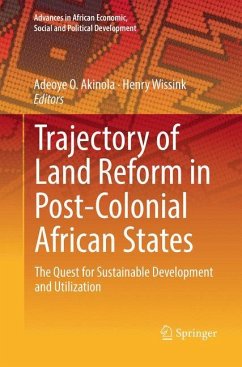
Democracy and Accountability in Post-Colonial Africa
Lessons from the Pre-Colonial Past. Case of the Lebu Republic, Senegal
Versandkostenfrei!
Versandfertig in 6-10 Tagen
45,99 €
inkl. MwSt.

PAYBACK Punkte
23 °P sammeln!
This book depicts the state of Africa s political institutions at the dawn of the 21st century, which float lifelessly atop local realities, and urgent development needs. The author describes that these institutions are not accountable to local ordinary Africans, mostly relegated to the ranks of second-class citizens in Africa s countryside. She contends that in Africa s recent past, endogenously grown institutions had sophisticated systems to ensure accountability of supreme leaders, who had to cater to the concerns of their nation. This book offers a major contribution to our understanding o...
This book depicts the state of Africa s political institutions at the dawn of the 21st century, which float lifelessly atop local realities, and urgent development needs. The author describes that these institutions are not accountable to local ordinary Africans, mostly relegated to the ranks of second-class citizens in Africa s countryside. She contends that in Africa s recent past, endogenously grown institutions had sophisticated systems to ensure accountability of supreme leaders, who had to cater to the concerns of their nation. This book offers a major contribution to our understanding of political institutions and relationships between governors and those governed that existed before the colonial interlude in Africa s history. Could lessons be learnt from pre-colonial institutional arrangements, in defining the institutions of the new Africa that will take the continent to a more promising future? Through the practical case of the Lebu Republic, oligarchic pre-colonial nation in Senegal, the author offers a blueprint for re-designing local political institutions in a way that is more culturally compatible with the values, and needs, of local citizens across Africa.












